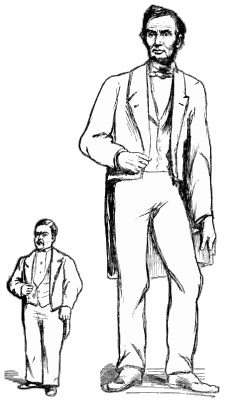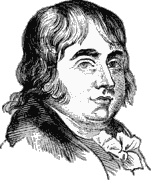
Aquasorbitiveness large.
George Morland, a talented painter, who died as he had lived, a great drunkard.
The 1871 book A New Physiognomical Chart by Joseph Simms, M.D. presents an original physiognomic classification system based on over 100 faculties -- such as characterioscopicity, computationumericality, and physiœlpidicity -- discernable by a combination of body types and facial features.
Each faculty is given an entry that includes a descriptive physiognomic characteristic; a grading scale from 1 to 12; methods to increase or decrease ones grade, should one choose; and illustrations of individuals who exemplify the faculty, positively or negatively.
While some of the faculty names are still in usage (e.g. "ambitiousness" and "credulousness" -- which Simms conveniently considers a faculty worthy of promotion), most are all but lost to the Internet (The Phrontistery doesn't even have a list!)
So, for the sake of huntatative types who wish to expand their linguastiveness, find grist for their salitive mill, or are just trying to tell their temporinaturalitiveness from their temporimechanicality, here's a glossary of select physiognomic faculties (those with high degrees of both amicitiveness and ordinimentality, please feel free to add these words to Wiktionary to edify future generations of physiognomicists):
- Acquiesciveness
- The disposition to be satisfied in a quiet manner.
- Amicitiveness
- The fraternal disposition and gregarious inclination.
- Angularitiveness
- The ability of appreciating the qualities and beauties of angles and straight lines.
- Animalimitationality
- The power of imitating the motions, postures, and actions of animal forms.
- Appetentiveness
- The faculty or quality of appetite.
- Aquasorbitiveness
- Appreciation and love of water-drinking, water scenery, bathing, etc.
- Assaultativesness
- The disposition to attack the rights or person of another.
- Autohegemony
- The faculty which gives a high estimate of one's own actions or capacities.
- Characterioscopicity
- The endowment which gives the power of penetrating and understanding the character of others.
- Chromaticalness
- The innate quality that clearly perceives and judges tints, hues, and colours.
- Computationumericality
- Skill in counting and reckoning.
- Concealativeness
- The inclination to hide or withhold the knowledge of things or thoughts—the instinct not to tell the mouse that the cat is watching until the mouse is caught.
- Consecutiveness
- The capacity of appreciating and producing propositions in consecutive order.
- Contrativeness
- This quality, or faculty, in human beings, is that which gives the disposition to assume the opposite, and in animals, to act contrary to the wishes of individuals, either men or animals.
- Curvativeness
- The capacity of being able to appreciate and judge of the beauties and qualities of curves.
- Demonlitiousness
- The propensity to mar, deface, or destroy.
- Economosity
- Faculty of economical management.
- Elevativeness
- That quality of mind that tends to elevate character as well as body.
- Factimemoriativeness
- The faculty of retaining previously attained knowledge.
- Futuritiveness
- The desire of a future life.
- Graspativeness
- The propensity to gain by extortion, or addiction to gain by plunder or oppression.
- Huntativeness
- The disposition to search for or follow after any person of thing.
- Intermutativeness
- The capacity of changing or placing one thing in lieu of another.
- Linguastiveness
- The ability to utter articulate sounds successively in such a manner as to convey intelligence.
- Locomotivity
- The desire of action and ability of changing place while preserving identity.
- Mentimitativeness
- The power that copies mental efforts.
- Mnemonicnominality
- The mnemonic power of recollecting names.
- Monoeroticity
- The disposition to love one only. (See Polyeroticity.)
- Morivalorosity
- The endowment that prompts its possessor to be courageous when thoughts require moral support.
- Olfactiveness
- Olfactiveness is the sense or faculty by which we perceive the qualities of substance by their effluvia or emanations.
- Ordinimentality
- The quality or endowment that inclines one to arrange and systematise thoughts, or ideas.
- Ordiniphysicality
- The desire to arrange physical substances, or attributes.
- Persistenacity
- The disposition of holding on, the propensity to pursue a course of designs or conduct.
- Philomonotopicalness
- The affection for one place, or, habit of becoming attached to one situation or locality.
- Philonepionality
- The characteristic of feeling pleasure in the young.
- Physiodelectatiousness
- The disposition and inclination for sensual delights.
- Physiœlpidicity
- The faculty of hope relating to the physical world and material things.
- Physioharmonitiveness
- The power which appreciates that physical condition in which all parts of the body are rounded and in perfect accordance.
- Physiovalorisity
- Material and corporeal courage; resistance to every species of physical force.
- Polyeroticity
- The disposition to love many. (See Monoeroticity.)
- Practicalitiveness
- The quality of being practical—making a good use of everything.
- Propotionativeness
- Recognition of the true relation of parts to each other.
- Puritativeness
- The virtue of chastity and innocence undefiled.
- Rectituditiveness
- The faculty that incites honesty of purpose and straight-forwardness of conduct.
- Sagacitiveness
- Sound of judgement and shrewdness are concomitants of the faculty of sagacitiveness.
- Salitiveness
- The power of seizing on thoughts and occurrences, and presenting them in a laughable manner, chiefly depending on quickness of fancy.
- Sentinelitiveness
- The precautious disposition that sets one or more on the watch, to keep a sharp look-out, and give warning of approaching danger.
- Solicitusreputativeness
- An innate wish for the favourable opinion of others.
- Solidativeness
- The power that judges of solidity or compactness.
- Sonidiffusitiveness
- The capacity of producing or making a sound or musical tone with the mouth,—vociferativeness.
- Spementality
- The faculty that desires some mental or spiritual good.
- Structurodexterity
- The ability of forming and constructing readily and dexterously, materials or mental products.
- Sublimitasity
- The expansive swelling of the soul that appreciates the elevated grandeur of nature as well as the elevating, lofty expression of thought and feeling—"all that expands the spirit yet appals."
- Temporimechanicality
- The ability to judge of time made by instruments, mechanical appliances, or direct motions.
- Temporinaturalitiveness
- The power of judging or comprehending the time of the year, the seasons, or the revolutions of the planets.
- Tonireceptionality
- The ability of receiving or appreciating tone, or sound.
- Tradistiveness
- The tendency to trade and barter.
- Voluntativeness
- Having strength of will and power to execute it.
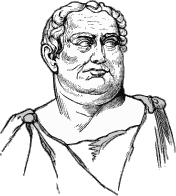
Appetentiveness high.
Vitellius, the sensuous gourmand Emperor of Rome, who ate 2000 dish of fowl and 7000 of fish at a single meal.
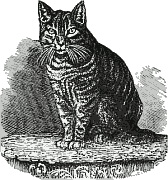
Consecutiveness large.
Selfish cat.

Monoeroticity large.
Mrs Margaret Fuller Osoli, whose connubial love was so strong that she preferred to drown rather than to leave her husband.

Monoeroticity small.
Brigham Young, the noted polygamist, who has upwards of sixty wives.
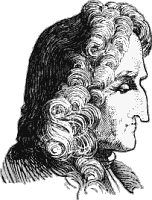
Practicalitiveness small.
Thomas D'Urfey, a facetious English poet, who wrote several plays and songs, yet they were of no practical value, and justly forgotten because of their licentiousness.
Also, be sure to check out Rocky vs. the King of Spain on page 13.
I'll leave you with this side-by-side comparison of Charles "Tom Thumb" Stratton (left) and Abe Lincoln (right) from page 15, illustrating the two extremes of the Osseous or Bony Form:
